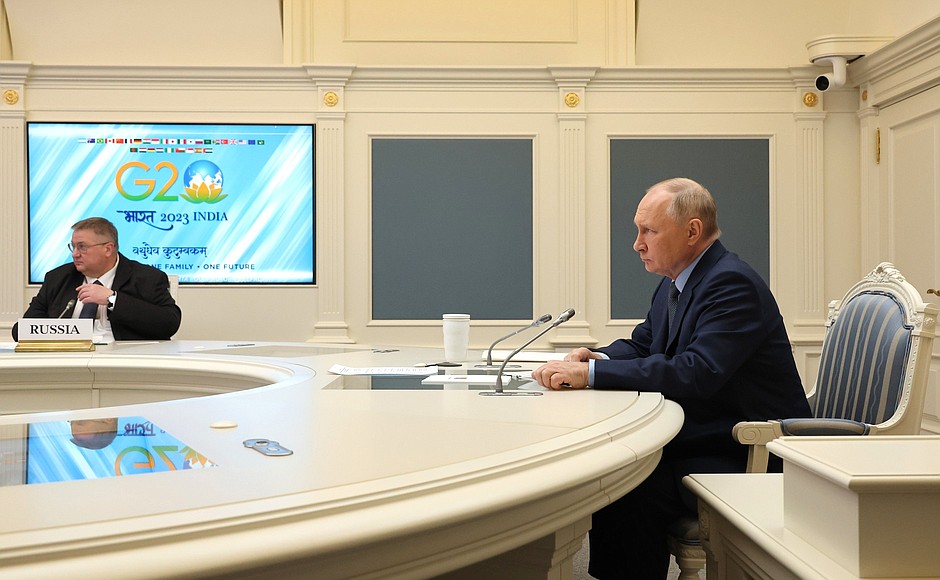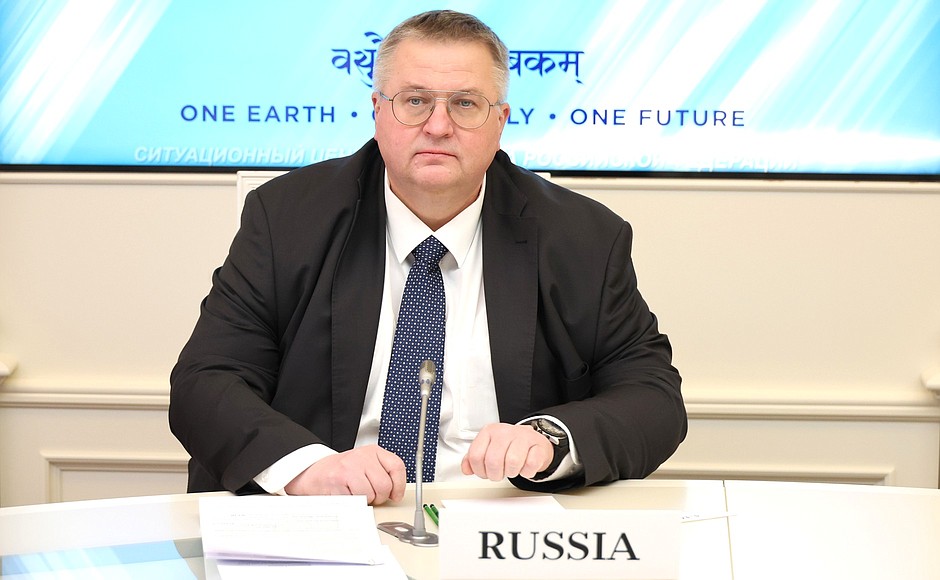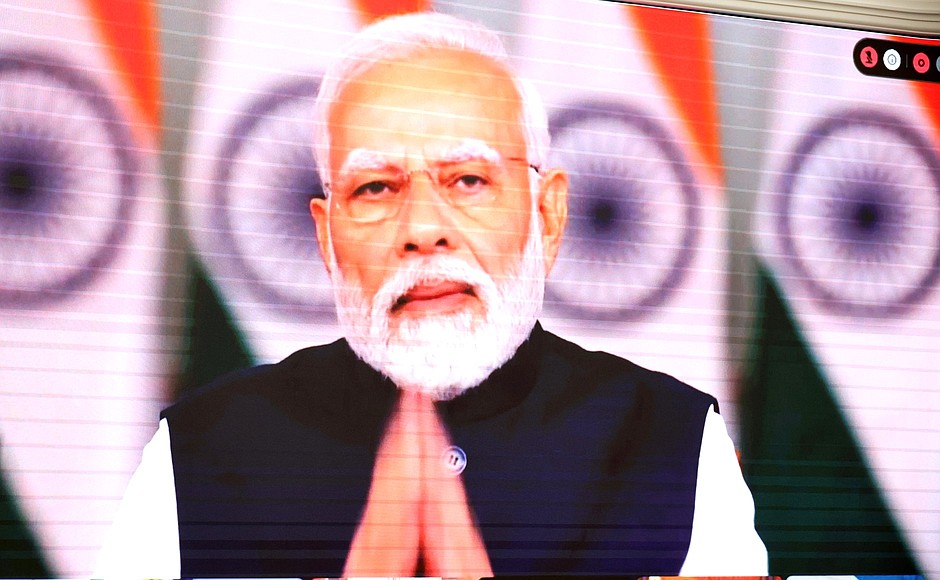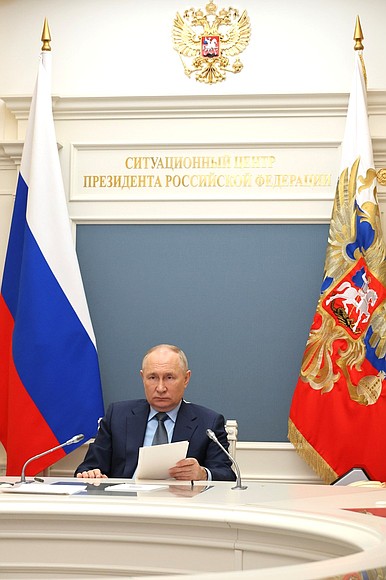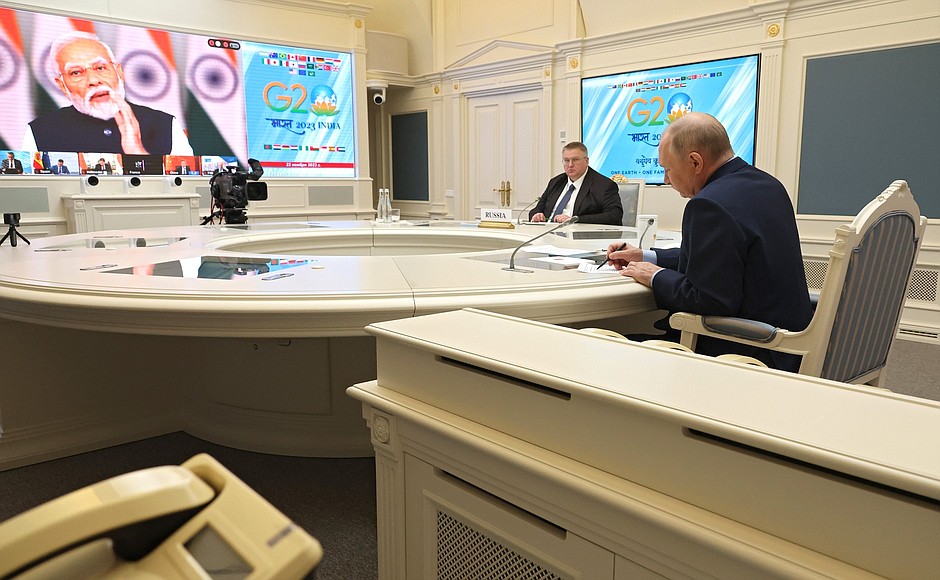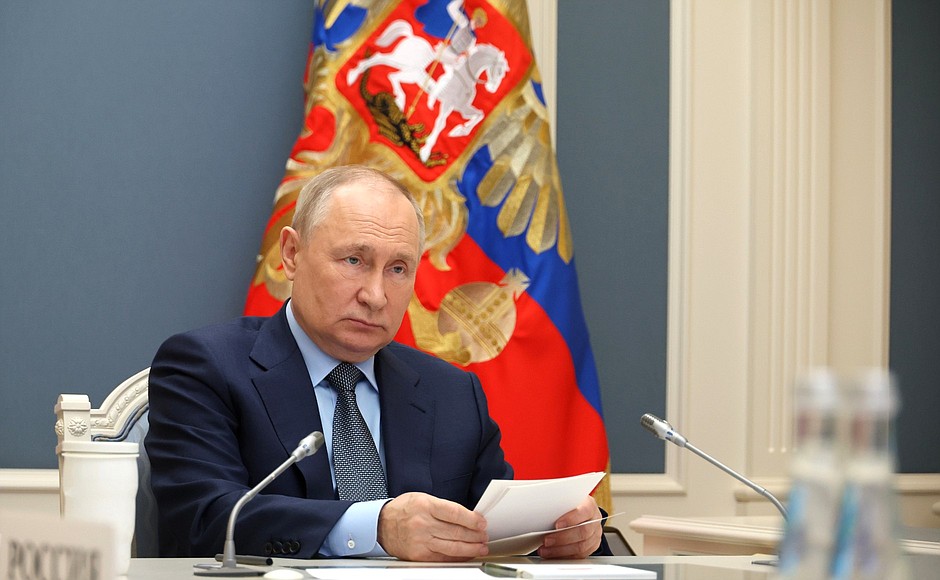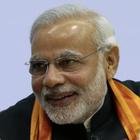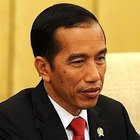The summit participants reviewed India’s presidency in 2023 and discussed the situation in the global economy and finance, the climate agenda, the digitalisation and other issues.
* * *
Prime Minister of India Narendra Modi (retranslated): Your Highnesses, Excellencies,
Namaskar!
I express my gratitude to all of you for accepting my invitation and joining this summit today. On behalf of 140 crore Indians, you all are heartily welcomed.
Friends,
I remember the moment when my friend, the President of Indonesia, Joko Widodo, handed me the ceremonial gavel on November 16 last year. At that time, I had said that together we will make the G20 inclusive, ambiguous, action-oriented and decisive.
Over the past year, together we have realized that vision. Together we have taken G-20 to new heights. Amidst a world fraught with distrust and challenges, it is mutual trust that binds us, connects us to each other.
In this one year, we have believed in “One Earth, One Family, One Future”. And, we have shown unity and cooperation beyond controversies.
I can never forget that moment when all of us in Delhi unanimously welcomed the African Union to the G-20. The message of inclusivity that G-20 has given to the whole world is unprecedented. It is a matter of pride for India that Africa has got a voice during its Presidency.
In this one year, the whole world has also heard the echo of the Global South in G-20. In the Voice of Global South Summit last week, about 130 countries have wholeheartedly appreciated the decisions taken at the New Delhi G-20 Summit.
The G-20 has emphasized the adoption of a human-centric approach while supporting innovation and digital technology. The G-20 has renewed faith in multilateralism. Together we have given direction to multilateral development banks and global governance reforms. And along with these, during the Presidency of India, G-20 has got the recognition of People’s 20. Crores of ordinary citizens of India joined G-20, and celebrated it as a festival.
Your Highnesses, Excellencies,
When I had proposed this virtual summit, there was no forecast of what the global situation would be today. Recent months have brought forth new challenges. The insecurity and instability in the West Asia region, concerns us all.
Our coming together today is a sign that we are sensitive to all these issues and stand together to resolve them. We believe that terrorism is unacceptable to all of us. The death of civilians, wherever they may be, is condemnable. We welcome the news of the release of hostages today, and hope for the swift release of all hostages.
Ensuring the timely and continuous delivery of humanitarian aid is imperative. It is also crucial to ensure that the conflict between Israel and Hamas, does not take on any kind of regional form. The clouds of crises that we are witnessing today, as One Family, we possess the strength to work towards peace.
From the point of view of human welfare, we can strengthen our voice against terror and violence, and for humanity. Today, India is prepared to walk together shoulder to shoulder, to meet the expectations of the world and of humanity.
Friends,
The 21st century world will have to give top priority to the concerns of the Global South moving forward. The countries of the Global South are going through many difficulties for which they are not responsible. In this context, the need of the hour is to give our full support to the development agenda.
It is important that reforms are brought in the global economic and governance structures to make them bigger, better, effective, representative and future ready. Ensuring timely and affordable assistance to countries in need. Implement the action plan adopted to accelerate the 2030 Sustainable Development Goals.
Friends,
Our Aspirational District Program stands as a notable example of progress in the SDGs at the local level in India. I invite the G-20 countries and the Global South to examine the Aspirational District Programme, and witness the transformative impact it has had on the lives of 25 crore people in India.
Friends,
At the New Delhi Summit, a decision was made to establish a Digital Public Infrastructure Repository, and I am pleased to announce its completion. Over 50 DPIs from 16 countries have been incorporated into this repository. To facilitate the implementation of DPIs in Global South nations, I propose the creation of a Social Impact Fund. On India’s behalf, I also announce an initial contribution of 25 million dollars to this fund and hope for your participation in this initiative.
In the era of Artificial Intelligence, there is a need to use technology in a responsible manner. There is growing concern about the negative use of A.I all over the world. India firmly believes that we should work together on global regulation of A.I. We have to move forward, understanding the seriousness of how dangerous DeepFake is, for society, for the individual. We desire that A.I. should reach the people, and it must be safe for the society. With this approach, the Global A.I. Partnership Summit is being hosted in India next month. And I believe all of you will cooperate in this as well.
Friends,
At the New Delhi Summit, I had talked about green credit regarding environmental protection. You know that in India we have started it. Through the Global Biofuels Alliance launched in New Delhi, we are reducing carbon as well as promoting the development of alternative fuels. The G-20 has recognized mission LiFE, i.e. Lifestyle for Environment, for a pro-planet approach; called for taking renewable energy three times by 2030; shown commitment towards clean hydrogen; recognized the need to take climate finance from billions to trillions. In a few days, during the COP-28 which will be held in the UAE, concrete steps need to be taken on all these initiatives.
Friends,
A new working group on women empowerment has also been formed. In this context, I am very happy to share that India has taken a historic decision in the first session of its new Parliament House. To strengthen women-led development, we have decided for 33% reservation for women in Parliament and state legislative assemblies.
Friends,
I end my statement here.
<…>
President of Russia Vladimir Putin: Colleagues,
First of all, I would like to express my gratitude to the Prime Minister of India, Mr Modi, and all our Indian colleagues for their productive work during India’s G20 presidency this year.
They have done a lot to focus the activity of the G20 member states on finding solutions to truly pressing issues on the international socioeconomic agenda. This was the purpose the G20 was created for, as an important multilateral governance tool in the global economy and finance.
In our view, there is an increasing need for this kind of consolidating approach today, especially because various confrontational attempts continue to be made.
Some of our colleagues here have mentioned that they are shocked by “Russia’s ongoing aggression in Ukraine.” Indeed, military operations are always a tragedy for specific people, specific families, and the country as a whole. And we must certainly think about how to stop this tragedy.
Russia has never refused to negotiate peace with Ukraine. It is not Russia, but Ukraine that has publicly announced that it is withdrawing from the negotiation process. Moreover, the country’s leader signed an executive order prohibiting such negotiations with Russia.
I understand that this war and the loss of life are shocking and could not be otherwise. But what about the bloody coup in Ukraine in 2014, which was followed by the Kiev regime’s war against its own people in Donbass? Did that not shock you? Are you not shocked by the extermination of civilians in Palestine and the Gaza Strip today? Is it not shocking that doctors have to operate on children – do abdominal surgeries – and use a scalpel on a child’s body without anaesthesia? Did it not shock you when the UN Secretary-General said that Gaza has turned into a huge children’s cemetery?
Colleagues,
The state of affairs in the global economy and the world at large require collective, consensus-based decisions that reflect the views of the overwhelming majority of the international community, including both developed and developing countries.
Dramatic transformation processes are underway in the world. New powerful global economic growth centres are emerging and gaining strength. A significant portion of global investment, trade and consumer activity is shifting to the Asian, African and Latin American regions, which are home to the majority of the world’s population.
Market turbulence is on the rise. Chronic issues in the international financial sector, as well as energy and food security challenges, are intensifying. By the way, Russia is fulfilling all its commitments in this area and remains one of the largest food exporters. I am here to let you know that the first ships with free Russian grain have been sent to African countries in need.
I would also like to note that the enormous stress on the global economy is a direct consequence of the ill-considered macroeconomic policies of some countries. These actions were justified by the need to fight the pandemic, among other reasons. Trillions of dollars and euros injected into the economy and the banking system have triggered a surge in global inflation and a rapid increase in food and energy prices. This underlies the events that I mentioned above. It is not our actions, not our attempts to restore justice in Ukraine. No. It is the actions of the world's largest economies. As a result, we saw an increase in key interest rates. The poorest countries were hardest hit by that, of course.
Unlawful trade restrictions and the climate agenda pursued by some countries in order to improve their own competitiveness, continue to have a negative impact.
In order to eliminate competitors and to gain advantages, dishonest methods of competition are used, including the destruction of transport and logistics chains and international payment arrangements, and even acts of state terrorism. The explosion at the Nord Stream gas pipeline under the Baltic Sea is a glaring example.
Russia advocates restoring the spirit of open and mutually beneficial international economic cooperation based on the UN Charter and the principles of collegial and mutually respectful joint work. It is important to achieve an effective optimisation of the global economic governance system, in particular, to restart the WTO in its entirety, including its arbitration function.
We need to enhance the role of developing economies in international financial institutions, including the IMF and the World Bank, and to use those bodies’ resources to promote the development of countries and regions that really need it, and not for opportunistic political purposes.
We are ready to work together to address these urgent issues at the G20 and other international institutions, including BRICS, an association that is gaining weight and influence – this much is obvious, especially considering its ongoing expansion.
Our country will certainly continue to contribute to the balanced achievement of the Sustainable Development Goals, and to work on preserving the climate and biodiversity of our planet, the digital transformation of the global economy, and ensuring food and energy security.
I would like to note that Russia prioritises the development of digital public infrastructure and strengthening information security. In fact, most of our public services are already available digitally.
As a responsible participant in global efforts to combat climate change, Russia plans to achieve carbon neutrality no later than 2060. For this purpose, we are using every available and effective tool to reduce greenhouse emissions: nuclear energy, hydropower, increasing carbon sequestration in forests, and using environmentally friendly technologies in all sectors of the economy.
I would also like to mention some tangible steps Russia has been taking to promote women’s economic empowerment and greater role in other spheres. Women have a secure and significant presence in Russian government and business today; they head many leading companies, research institutes and public organisations.
In conclusion, I would like to once again highly praise the efforts of India’s presidency and wish success to our Brazilian friends, who will take over the G20 presidency on December 1.
Thank you for your attention.
